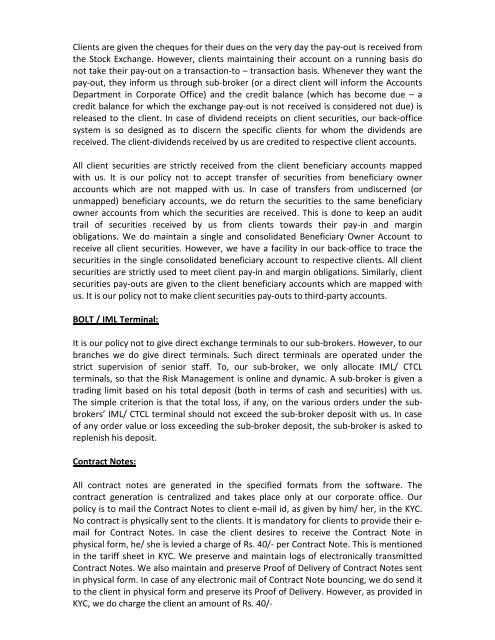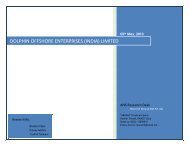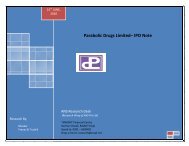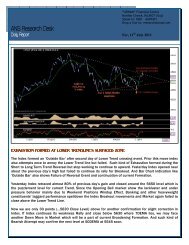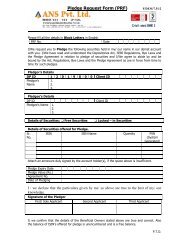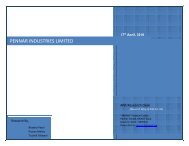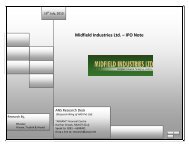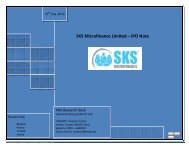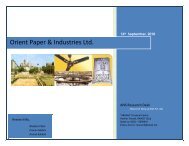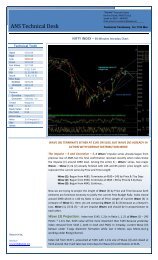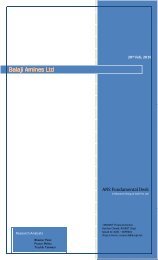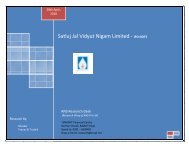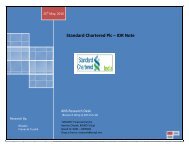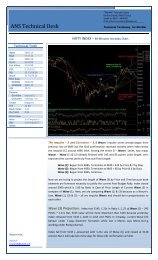haircut
INTERNAL CONTROL POLICY
INTERNAL CONTROL POLICY
- No tags were found...
You also want an ePaper? Increase the reach of your titles
YUMPU automatically turns print PDFs into web optimized ePapers that Google loves.
Clients are given the cheques for their dues on the very day the pay-out is received fromthe Stock Exchange. However, clients maintaining their account on a running basis donot take their pay-out on a transaction-to – transaction basis. Whenever they want thepay-out, they inform us through sub-broker (or a direct client will inform the AccountsDepartment in Corporate Office) and the credit balance (which has become due – acredit balance for which the exchange pay-out is not received is considered not due) isreleased to the client. In case of dividend receipts on client securities, our back-officesystem is so designed as to discern the specific clients for whom the dividends arereceived. The client-dividends received by us are credited to respective client accounts.All client securities are strictly received from the client beneficiary accounts mappedwith us. It is our policy not to accept transfer of securities from beneficiary owneraccounts which are not mapped with us. In case of transfers from undiscerned (orunmapped) beneficiary accounts, we do return the securities to the same beneficiaryowner accounts from which the securities are received. This is done to keep an audittrail of securities received by us from clients towards their pay-in and marginobligations. We do maintain a single and consolidated Beneficiary Owner Account toreceive all client securities. However, we have a facility in our back-office to trace thesecurities in the single consolidated beneficiary account to respective clients. All clientsecurities are strictly used to meet client pay-in and margin obligations. Similarly, clientsecurities pay-outs are given to the client beneficiary accounts which are mapped withus. It is our policy not to make client securities pay-outs to third-party accounts.BOLT / IML Terminal:It is our policy not to give direct exchange terminals to our sub-brokers. However, to ourbranches we do give direct terminals. Such direct terminals are operated under thestrict supervision of senior staff. To, our sub-broker, we only allocate IML/ CTCLterminals, so that the Risk Management is online and dynamic. A sub-broker is given atrading limit based on his total deposit (both in terms of cash and securities) with us.The simple criterion is that the total loss, if any, on the various orders under the subbrokers’IML/ CTCL terminal should not exceed the sub-broker deposit with us. In caseof any order value or loss exceeding the sub-broker deposit, the sub-broker is asked toreplenish his deposit.Contract Notes:All contract notes are generated in the specified formats from the software. Thecontract generation is centralized and takes place only at our corporate office. Ourpolicy is to mail the Contract Notes to client e-mail id, as given by him/ her, in the KYC.No contract is physically sent to the clients. It is mandatory for clients to provide their e-mail for Contract Notes. In case the client desires to receive the Contract Note inphysical form, he/ she is levied a charge of Rs. 40/- per Contract Note. This is mentionedin the tariff sheet in KYC. We preserve and maintain logs of electronically transmittedContract Notes. We also maintain and preserve Proof of Delivery of Contract Notes sentin physical form. In case of any electronic mail of Contract Note bouncing, we do send itto the client in physical form and preserve its Proof of Delivery. However, as provided inKYC, we do charge the client an amount of Rs. 40/-


